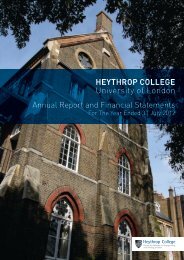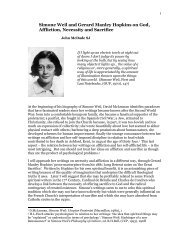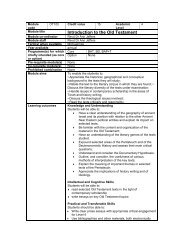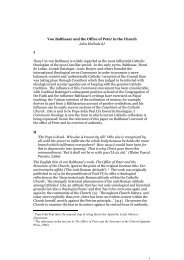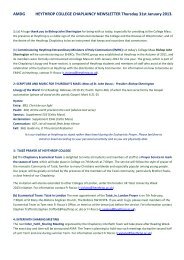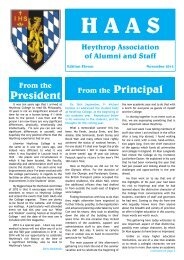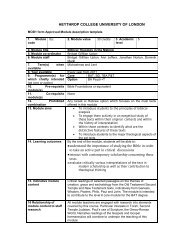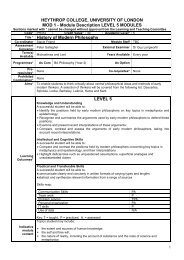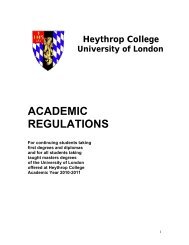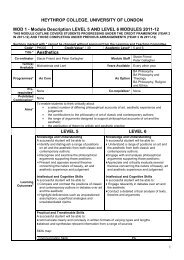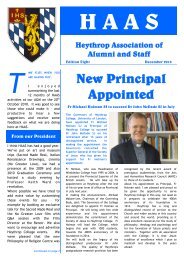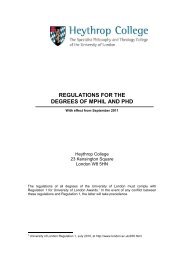Wallace_Stevens.pdf - Heythrop College
Wallace_Stevens.pdf - Heythrop College
Wallace_Stevens.pdf - Heythrop College
Create successful ePaper yourself
Turn your PDF publications into a flip-book with our unique Google optimized e-Paper software.
12<br />
fictive abstract is as immanent in the mind of the poet, as the idea of God is immanent in<br />
the mind of the theologian. The poem is a struggle with the inaccessibility of the<br />
abstract. 37<br />
When he tries ‘to be a little more precise about the enigma’, he backs off from it for fear that the<br />
too much rational attention will destroy ‘the poetry of the idea’. He really doesn’t know what he is<br />
talking about, and that is good and right; Herbert McCabe used to say that Thomas Aquinas<br />
thought that theologians don’t know what they are talking about. By definition, theology is about<br />
nothing (‘no-thing’). <strong>Stevens</strong>’ comments in this letter can replicated in the experience of any<br />
theologian or any ‘school of rabbis’ trying to speak about God. Why should it surprise us that<br />
<strong>Stevens</strong> encounters the same problems of knowing how to refer and how to predicate anything of<br />
a reality that by definition is indeterminate God (‘the abstract’) is not accessible to language.<br />
His statement ‘the abstract does not exist’ corresponds exactly to the scholastic principle, Deus<br />
non est in genere: God is not one thing in a category of things, so how can words of existence and<br />
attribution be predicated of either ‘the abstract’ or ‘God’ As the theologian does not know how to<br />
proceed, neither does the poet. If the poem is ‘a struggle with the inaccessibility of the abstract’,<br />
so is theology. How can we get it right if we do not know what it is And ‘where’ is it Not a silly<br />
question at all, I think. Look at how Riddel, reviewing the publication of <strong>Stevens</strong>’ letters in 1967,<br />
interprets <strong>Stevens</strong>’ ‘Notes Toward a Supreme Fiction’:<br />
…its occasion is the process of the mind contemplating what it can conceive of but not<br />
possess – an ultimate reality – except that it possesses the supreme in its very grasp of<br />
the possibilities of the supreme. The mind, that is to say, possesses its moment of the<br />
supreme in the act of meditating the idea of the supreme; for the idea is its own creation.<br />
If the imagination exists only in relation to otherness, it realizes itself only in the<br />
phenomena of its own creation – what we call the poetic image, the fiction….this impulse<br />
[towards the supreme fiction] is nothing less than the primal impulse of the imagination<br />
seeking the ‘centre of reality’, seeking repose or order, a place to realize itself. For the<br />
‘centre of reality’ lay assuredly within the self, even as reality lay without.<br />
For the supreme fiction, <strong>Stevens</strong> seems to discover, exists not beyond not out of this<br />
world, but in the center of the self, and in the imagination’s new beginnings. It is the<br />
image of the human need to discover its humanness, and the pleasure it affords is the<br />
pleasure of bringing into reality, or image, what otherwise is only the formlessness of<br />
desire. 38<br />
This is helpful because it identifies how the supreme fiction is significant for us and where this<br />
significance lies. It is our internal version of the external world: that might be an initial<br />
description. It comes to realisation in us through the idea that we devise of it; the idea conveys<br />
the real in a significant way. We can say, surely tautologously, that the imagination expresses<br />
itself, ‘in the phenomena of its own creation’ and in these phenomena – surely the images and<br />
linguistic webs of imagined versions of the real – it expresses the ‘human need to discover its<br />
humannness’. The supreme fiction then is how we construe the real in ways that please us and<br />
that enable us to be at ease with our identities by constructing a ‘house of imaginative meaning’<br />
drawn from, but ultimately tangentially related to, the world outside. 39<br />
The supreme fiction would be how our humanity is delivered to us through the imaginative webs<br />
we create, by which we enchant ourselves by a detour through the external world on which<br />
variations, ‘asides’, are played intellectually and sensually. This may be what <strong>Stevens</strong>’ ‘supreme<br />
37 L, 434-5<br />
38 The English Journal 56 (1967), 525-34; 527, 530.<br />
39 This is not far from Rilke. ‘The primary task of living, for Rilke, is imagining the real: interior<br />
representation of Chartres, music, night, spring, earth and tree.’ (M.R.Miles, Reading for Life:<br />
Beauty, Pluralism and Responsibility (Continuum, 1997),137. ‘Nowhere, beloved, can world exist<br />
but within.’ (R.M. Rilke, Duino Elegies 7)



